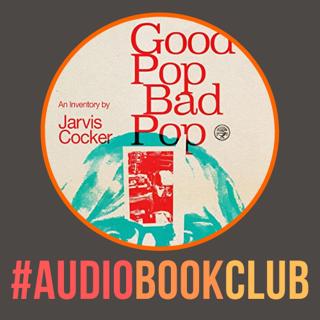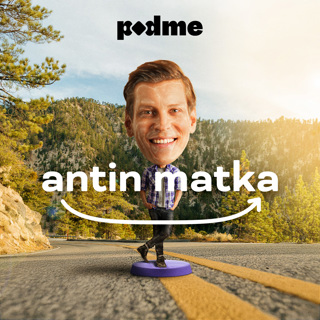
'The Secret of Secrets' by Dan Brown
On this episode of #AudioBookClub: THE SMELL OF DEATH! Steve Phillips and Matthew Layton present #AudioBookClub, a weekly podcast that reviews and recommends audiobooks. On this week's episode we are casting an ear over the first new novel in eight years from the author of The Da Vinci Code The Secret of Secrets Robert Langdon Book 6 A: Dan Brown N: Paul Michael L: 22 hrs and 50 mins R: 09-09-25 P: Penguin Audio #Literature #Fiction Please get involved in the conversation @SteveKPhillips and @WhingeingPom #AudioBookClub.net #AudioBookClub on facebook, instagram, Bluesky or X On the next episode of #AudioBookClub: Clown Town Slough House, Book 9 A: Mick Herron N: Sean Barrett R: 11-09-25 L: 12 hrs and 6 mins P: Baskerville #Mystery #Thriller #Suspense
21 Syys 38min

'A Particularly Nasty Case' - by Adam Kay
On this episode of #AudioBookClub: The first novel from international best-selling author - and former junior doctor - Adam Kay. Steve Phillips and Matthew Layton present #AudioBookClub, a weekly podcast that reviews and recommends audiobooks. On this week's episode we are casting an ear over 'A Particularly Nasty Case' - by Adam Kay A Particularly Nasty Case A: Adam Kay N: Andy Serkis R: 28-08-25 L: 10 hrs and 9 mins P: Orion #Literature #Fiction Please get involved in the conversation @SteveKPhillips and @WhingeingPom #AudioBookClub.net #AudioBookClub on facebook, instagram, Bluesky or X On the next episode of #AudioBookClub: The Secret of Secrets Robert Langdon Book 6 A: Dan Brown N: Paul Michael L: 22 hrs and 50 mins R: 09-09-25 P: Penguin Audio #Literature #Fiction
8 Syys 54min

'Good Pop, Bad Pop' - by Jarvis Cocker
'Good Pop, Bad Pop' - by Jarvis Cocker On this episode of #AudioBookClub: As the band Pulp release their first new music in 25 years, we join frontman Jarvis Cocker for a rummage around his attic Steve Phillips and Matthew Layton present #AudioBookClub, a weekly podcast that reviews and recommends audiobooks. On this week's episode we heartily recommend Jarvis Cocker's new audiobook 'Good Pop, Bad Cop. Good Pop, Bad Pop A: Jarvis Cocker N: Jarvis Cocker R: 26th May 2022 L: 6hrs and 39 mins P: Jonathan Cape Join us as we explore the eclectic treasures from Jarvis's loft, reflecting on his life, music, and the cultural landscape of Britpop. From nostalgic anecdotes to insightful commentary, this episode is a celebration of creativity and the stories behind the objects that shape us. Please get involved in the conversation @SteveKPhillips and @WhingeingPom #AudioBookClub.net #AudioBookClub on facebook, instagram, Bluesky or X On the next episode of #AudioBookClub: Entitled The Rise and Fall of the House of York A: Andrew Lownie N: Andrew Lownie R: 14-08-25 L: 11 hrs and 40 mins P: William Collins #Biographies & #Memoirs TRANSCRIPT Steve Phillips: On this episode of Audiobook Club. As the band Pulp released their first new music in 25 years, we join frontman Jarvis Cocker for a rummage around his attic. Ben Folds: Good pop. Bad pop. An inventory by Jarvis Cocker, as read by me, Jarvis Cocker. Chapter one. There was a house I lived in for a while. I stored a lot of stuff in the loft of this house. When I say you stored a lot of stuff, that's really a polite way of saying used it as a skip. Steve Phillips: Audiobook Club, with Steve Phillips and Matthew Layton. Hello, and welcome to Audiobook Club, the podcast about audiobooks that is most definitely sorted out for ease and with. Thank you very much. And of course, what other line could we have had in the script there? Matthew Layton, welcome to the podcast. Matthew Layton: I did both things there, Steve. I did both copy and pace. Steve Phillips: You did, you did, absolutely. By the way, can I put a screeching halt to the podcast in the early seconds and, quickly dragging Conclave from our last episode, I think we did a massive disservice. Matthew Layton: Do you? Steve Phillips: Yeah. Robert Prevost was glued to the Conclave, you know So before we swing into Jarvis Cocker's, attic, let's, let's swing into the Pope's basilica. Matthew Layton: Okay. I, I, I said at the time, didn't I, that I thought it was like the Da Vinci Code, but without the fun. Steve Phillips: Yeah. But as I, as I, Because I hadn't finished the book, and as I finished the book and the denouement of who the, Pope was going to be from this Conclave. What a finish. What a finish. That's brilliant. I loved Conclave, and everyone should go and read it. There we go. Matthew Layton: Okay. I have to confess that actually, appropriately having. Indeed. Steve Phillips: When was your last one? Matthew Layton: Thursday. I have to confess that, I, Yeah, I found myself wanting to get to the finish and find out what the finish was. I predicted who would win, as I think everybody did, but I didn't predict the twist. Steve Phillips: I love you. This is the first time I've heard, actually. And, you know, I've been glued. I was glued to the Conclave, you know, as a lot of us were. no one ever talks about who won, who won the Conclave. It's the lottery or the footy. Matthew Layton: Who was the runner up? That's the important one. Steve Phillips: They should announce it, in a sense, like, get a bit, you know, get a bit Britain's Got Talent about it, you know, in ascending, ascending, descending, reverse order. And then the music. And let's face it, that place, the Vatican, is not Short of a dramatic tune or two, we could have had some light organ music going on the background, you know, and then a flourish at the end as we go. Robert Prevost, ladies and gentlemen. Matthew Layton: Chicago's finest. Steve Phillips: Indeed. There we go. So congratulations to, To Pope Leo. Matthew Layton: Yeah. Steve Phillips: From all or both of us here at Audiobook Club, for whatever that that's worth. And, And yes, definitely just as an addendum to our last episode where. Where we didn't give Conclave the most glowing of reviews. Go and read it. It's brilliant. Matthew Layton: Yes. Steve Phillips: Right. Matthew Layton: Pope. Pope Leo, quickly. Mazel tov. Yes. Steve Phillips: I've just got a rummage round in my. Matthew Layton: Are you're having a rummage now? Steve Phillips: Looking for the. I'm looking for the spanner to turn your. Your sensitivity. Decorum. Matthew Layton: You're turning my nuts. It'll be a little tiny one. Steve Phillips: Certainly, am. Right, okay, so we pivot now to this week's book. I love you putting the script here. You just put good cop, bad Right, okay, so we pivot now to this week's book. We are casting an ear over. Good pop, bad pop. I love you putting the script here. You just put good cop, bad cop. Fair enough. Matthew Layton: Oh, did I? Yeah, sorry. Steve Phillips: But Good pop, bad pop. and I did love that introduction, by the way, where. Where Jarvis does say. By Jarvis. Yeah, Me. Matthew Layton: Jarvis Love sums up the whole tone of the book and indeed his career. I think, you know, the way he refers to himself within the context of a formal structure with a little bit of a wink. I think he does, yeah. Steve Phillips: Which I think is annoying. There's a knowing wink, isn't it? It's like we've all been here. We've all been here rummaging throughout, rummaging through our attic and the quiet moments. Steve: The 90s were my 60s, I guess Matthew Layton: Now, now, I. You mentioned the script where I've done some. Some muzz. Prompting. I wanted to ask you, first of all, let's set this out properly. Who are, Pulp and what do you think of them, Steve? Steve Phillips: So if you've, So Pulp growing up. Well, certainly the. The 90s were my 60s, I guess. and. And Pulp were really at the forefront of those. It was a. Oh, you know what? The 90s just seemed like a really nice time when we're living in now. And when I think about the younger generation growing up and what they're having to kind of live with and how it's affecting them, the 90s was. Was. You know, obviously, they were. It had. It had its bad points. Of course, looking back now, you wouldn't get away with a lot of the stuff that was going on there. And quite rightly, however, in terms of music off, Brit pop was just fantastic. Original guitar songs, you know, original bands, amazing lyrics. It really did speak to the generation and really Pulp, were at the forefront of that and very good of them. I thought about start back in 1978 to kind of, yeah. Reach that peak in the 90s. They were, they were, they were right there. Common People was absolutely seminal. The video to Common People. I'll never forget watching that on the ITV chart show. And suddenly Jarvis Copper pops up in this shopping trolley. I, was just brilliant. It was. Yeah. So Pulpa were there. Right. Throughout the year, the 90s and also beyond. Matthew Layton: Oh, hold on, hold on, hold on. This is the second time Common People have featured on this podcast You mentioned, you mentioned Common People. The song. This, of course is the second time that not only Jarvis, but the song Common People have featured on this podcast. Can you remember the first time, to coin a phrase? Steve Phillips: Very nice. Matthew Layton: That was an accident. Steve Phillips: Different class back then. yay. Pulse Common People is about class divide amongst common people Now do we talk about William Shatner? Matthew Layton: Ah, we do, yes. Yeah, you called it. Exactly. It turns out, contrary to what I thought, you are actually listening while we're making this, this podcast too. So here's Ben Folds from, I think it was something like our fourth or fifth podcast. I met him in a lobby of a hotel in Adelaide and here he is bigging up Mr. M. Cocker. Matthew Layton: The word that jumps out at me from that part of it is also a word that I've heard you use in what is undoubtedly my favourite cover version of all time ever. no, tourist. Ben Folds: Tourist. Steve Phillips: Right. Matthew Layton: So, M. I only really understood Pulse Common People when I heard the Shatner version and heard the words independent of it. Steve Phillips: Right. Matthew Layton: Seems to me, am I putting too much meaning on a song that reflects your upbringing or is that just a happy coincidence? Ben Folds: Oh, no, no, I, I, I, I think that song is just probably the most insane, decisive pop song about that particular class divide amongst common people. Absolutely. He, Jarvis absolutely nailed it. I think it's his best song. It's just a beautiful song because it's the tourism part is the wonderful part of it. I mean that's, and, and it's a good way. And you know, I, I took it. Matthew Layton: So that's yeah, basically Ben Paul's saying, I grew up in a working class classroom, I hate class tourism too. Steve Phillips: yeah, and it's true of the lyrics that they, that they sung about. It was really, it really did speak, really did speak to you. It was very much a reflection of real life and attitudes and you know, don't get too full of yourself, basically. And their new single that was out recently, Spike island, it was another. Was another. You know, it's really. Oh, man. Yeah. A real renaissance for them, I think, over the, Over the summer to come. And looking forward to their album. Matthew Layton: Yeah, hold on. Steve Phillips: Going back. Matthew Layton: Going back to Common People for a second. And also. And it comes up about, you know, Jarvis's taste influences and aesthetics become a lot clearer. And they're laid out a lot clearer in this book than you would necessarily get from just listening to them in the background on the radio. You know, there's always more to it. In fact, do you know what Spike Island's about? Steve Phillips: Yes, it's about Stone Roses gig on Spike Island. Matthew Layton: Right. Okay. So you see, I did. I knew it was something cooler than I am, but I didn't. I didn't know what it was. There's a bit. Steve Phillips: He didn't go. Never went to the gig. No, but he. He, I think he got stories. I think he got a story of basically as a DJ there. it's a. It's a sequel to Sorted For Ease and Whiz, this new single, Spike island, because it was to do with people who kept repeating a phrase over and over again. It stuck in Jarvis Cocker's head. Basically. Sorted for Ease and Wiz. This guy kept. Kept sort of. I don't know if it might be the same. I think it was at the same gig. Kept asking everyone if they were Sorted For Ease and Whiz over and over and over again. And the. And Spike island comes from the hapless dj, who's trying to get the crowd going by going, spike island, come alive. Spike island, come alive. And that again, that's stuck in Jarvis Cocker's head. so that it went in the song. So that's one of the lyrics. It's like, spike island come alive again. I think it was that anyway. Yeah. So that's where it comes from. Matthew Layton: You're a huge Pulp fan. In fact, you mentioned that when we were talking about the stuff we've listened to on the BBC and the last week you made the point that you had listened to BBC 6 Music specifically to catch the. The new song and. And an interview, didn't you? So you're quite a big fan. And you're. You're into them, aren't you? Steve Phillips: Well, I'm into them, but I, You know, not. I mean, I wouldn't say I'm a close fan. I think what it does is. It's part of my. My total malaise in. In being, you Know, very misty eyed about the past, thinking how much nicer it was. So, you know, if it had been Blur making a comeback and they launched a smash single, I might be all about that or Suede or, I don't know, Sleeper or something. Matthew Layton: I just realised, oh, I've met Louise from Sleeper twice. Steve Phillips: One, of our friends actually did a pog, does a podcast and I think, starring Louise, winner from Sleeper. Matthew Layton: Top poker player as well as rockstar and novelist. Steve Phillips: It's called the Crisis. The Crisis, right. Where she interviews people about how they're dealing with a midlife crisis when they were like, big in. Matthew Layton: I would love to hear that. I met her after a gig she did in Hamburg So I met her twice. I met her after a gig she did in Hamburg and I went, hi, I'm. I'm living here in Hamburg. And, I, really like what you're doing. And she was really nice. She came out and had drinks with the audience after the show and she did the same. I think it was about eight years later in Vancouver. I said, I remember, I saw you in a Hamburg. And she was very lovely. Steve Phillips: And at that point, despite your Tommy. Matthew Layton: Cooper impression, at that point, yeah, I. I had to go, oh, she's really nice. And, she's also beautiful, but I have to go away now because I'm too drunk. Steve Phillips: There you go. Matthew Layton: That's very interesting. That's a bad face. Steve Phillips: Do you know what? Actually it's interesting you say that because I can't meet my heroes, I can't meet anyone famous without coming across. As you've probably heard on this podcast, I just come across all sycophantic. And thank you for being in the same orbit as us and deigning to, you know, grace us with your presence. I can't. I don't know why, because, you know, m. I've worked in lots of orbits and things, but I have to sort of work with them for 10 years before, before we speak. Matthew Layton: I'll tell you why that is, Steve. It's because you're a lovely human being. Should we move? Get this. I'm gonna do you. I'm gonna do your bit now. Should we move from. From orbit to Wrigley's Extra? Steve Phillips: There you go. You see how I do that more subtly than you? You just go, shut up, Steve. I'm gonna say this now. That's basically go. I think of my segues. How do you feel about Pulp over the years Gentlemen. Matthew Layton: Can we just. Before we do it, can we just do the class thing again? Because, Thanks for asking how I feel about Pulp. That's really kind of you as much I've just said you. Steve Phillips: How do you feel about Pulp? Matthew Layton: Well, do you know what, as a kid who went to a public school and this is very defiantly a working class point of view and I sort of felt that it was a party to which I was not invited. And as I say, they were there, they were part of the background. But I have to say that over the years, possibly in the same way as you, you know, I didn't necessarily get it at the time, but they creep up on you, don't they? And it becomes part of the, or the sort of the furniture that, you know, it becomes familiar. The same with David Bowie. I, I've heard so many people rattle on so much about David Bowie, but the first time I heard him, when I was eight years old, it was let's Dance. It was a perfectly reasonable pop song. And again, yeah, for me Pulp were part of the time and didn't stand out for me. But over the years I think I've grown to respect and like them more. And part of that actually was Jarvis's six music show where I started to get what he was on about just by the, the general subjects that he covered and, and the way that he spoke. So, so yes, I like them more now. I think I understand it better. Steve Phillips: Yeah, I used to love Jarvis Cockers, Jarvis Cocker's Night Shift where he sort of, you know, explored the the world of night shift workers and things. That was. Yeah, it was really good. And I like his delivery as well. I mean this book was certainly something you could literally go. It's literally a book at bedtime because you could quite happily go to sleep listening to it. It was really at that sort of feel about it where you just be sent off to a really nice sort of nice sort of cosy place and then you can just kind of drift off. Anyway, don't drift off just yet because we've got to do our three step process. Good Pop, Bad Pop is an intimate and immersive biography of Jarvis Cocker There it is, where we talk about the author, we talk about the text of the book and then we discuss the performance, or indeed narration of the audiobook. And does the audio version bring anything vastly superior to just buying it off a shelf and reading the thing? So Matthew, the author himself, like we've just been speaking about him for the last 20 minutes. Matthew Layton: Anyway, yeah, Jarvis Branson Cocker was born on 19th September 1963. He is an English, it says on Wikipedia, musician. I'd put that in inverted commas a bit. As the founder, frontman, lyricist and Only consistent member of the band Pulp. He became a reluctant figurehead of the Brit pop genre in the mid-1990s. Funny, I just remembered. Do you remember when he, he, he did, a stage invasion at the Brit Awards for Michael Jackson? Do you remember that? Steve Phillips: Oh, yeah, yeah, yeah, yeah. Matthew Layton: He, Michael Jackson was performing Earth Song, and it was all rather over the top. Jarvis had had a couple of whiskeys and jumped, up on the stage, danced around a bit and then kind of got a bit lost and was shown to me, the audience. Yeah. Did he moan the audience? I'd forgotten that. Steve Phillips: I think he did. I think he got it. I think he got his, his posterior out. Yeah. And Bob Mortimer got him. Got him off of the legal thing. Matthew Layton: Oh, did he? Steve Phillips: Yeah, he did, yeah. the anecdote, I think was Bob. Matthew Layton: Mortimer, m bloke in a pub told you, and it was on the Internet. That's two independent sources. It must be true. Cocker has also pursued a solo career, and for seven years he presented the BBC Radio 6 music show, Jarvis Cocker's Sunday Service. Ah. And he was replaced by Iggy Pop in that slot. So it just shows you the. The sort of status that he is held in in this country. Steve Phillips: I love, the idea of a Sunday surface, though. It'd be a big doily on it. Wouldn't there be nice sort of lace tablecloth on a Sunday. Matthew Layton: You know what? You're hitting all the marks this week. You're getting everything absolutely right. yeah, Doilies. You'd think there might be some doilies somewhere in Jarvis's attic. Steve Phillips: Yeah. Oh, there's got to be, isn't there? Matthew Layton: Yeah, exactly. Steve Phillips: Covered in the book. That's for book two, clearly. Matthew Layton: Well, why don't you? Again, the only reason people tune into this nonsense is the wonderful way in which you read the blurb out of. Off of the back of books. Please, maestro, take it away. Steve Phillips: As we know, that's an utter lie. What if the things we kept hidden say more about us than those we put on display? We will have a random collection of the things that made us. Photos, tickets, clothes, souvenirs stuffed in a box, packed in a suitcase, crammed into a drawer. When Jarvis Cocker starts clearing out his loft, he finds a jumble of objects that catalogue his story and ask him some awkward questions. Who do you think you are? Or who do you think you are? Are clothes important? And why are there so many pairs of broken glasses up here? From a gold star poly cotton shirt to a pack of Wrigley's extra. From his teenage attempts to write songs to the sexy laughs, fantastic dirty joke book, this is the hard evidence of Jarvis's unique life. Pulp 20th century pop culture, the good times and the mistakes he'd rather forget. And this accumulated debris of a lifetime reveals his creative process. Writing a musicianship, performance and ambition, style and stagecraft. This is not a life story, it's a lost story. It is definitely a story. Recorded on location with the author and featuring archival material, Good Pop, Bad Pop is an intimate and immersive listening experience with an icon of British culture. And by the way, his dancing. Now I, I've made a reference to this because I saw him on Jonathan Ross doing his new single Pulpit and, and the dancing he was doing, he clearly was thinking long term because, you know, as you get older, you see ageing rock stars not being able to move about as once they could and jump about the stage. And so Jarvis Cocker, I'm pretty certain seeing a live gig with him back in the day, was doing these strange arm movements. He'd just stand there and just do these wiggly arm, ah, movements, thinking, actually, you know what, I'll be able to do the same again when M. I'm 60. Matthew Layton: Yeah. There's another thing about that which is you. The thing at the time that made him different from the other, his contemporaries, the Blurs and Oasis is who you've mentioned is, you know, he was known originally as a, as somebody quite weird who once came on stage in a wheelchair, so, you know, doing really odd stuff like that. And I think, again, this book has helped me understand where that's come from. And turned on several lights, as you say, or as you read. Jarvis rifles through this attic in, his house in the uk, where he hasn't been for a number of years. He goes through all the stuff because he's accrued so much, rubbish. And one of the things that runs through the book is he picks up individual items, tells the bit of his life that it reminds him of and then he plays keep or cob. Cob being the Sheffield term, for to throw something. So is he going to keep it or is he throw it? You've mentioned the Wrigley's. The first couple of things are the Wrigley's extra chewing gum, that's 20 years old from the days when it used to come in stick form rather than sort of the pellets that it's in now. Plastic collar stiffness. more importantly, his teenage, his teenage notebook, which has lots of secrets in fact, I'm going to. I'm going to go. I'm going to go early for a clip. Steve Jarvis' Pulp Master Plan was written in his teenage notebook Steve. Steve Phillips: Okay. Matthew Layton: There's a bit in, in his teenage notebook there is a a bit where he calls it the, the Pulp master plan where 15 year old Jarvis maps out what. It's almost like a political manifesto of what pulp should be. And I think when we listen to this, you'll hear that. I think he, I think he managed to stick to it even till today. Ben Folds: The Pulp Master Plan. The group shall work its way into the public eye by producing fairly conventional yet slightly offbeat pop songs. After gaining a well known and commercially successful status, the group can then begin to subvert and restructure both the music business and music itself. It's the old Change the system from within Approach pop success as Trojan Horse. This is my younger self's way of reconciling pop ambitions with my newly found punk ideals. I'm quite impressed. Matthew Layton: So I think, you know, if you come as far as Spike Island, I think what I mean, he hasn't managed to change the entirety of music, but other than that, I think he sticked every box on his list there. Steve Phillips: Yes. Matthew Layton: In fact, Steve, just before we came on air, we don't normally like. What did we have the other day? We had, we had a, a book that referred us to look at. We had to look at the PDF and look at graph number 14. I think it might have been one of the sleep books that we were reading. But I pointed out to you the, the PDF that came. The accompanying PDF that came with this book which I didn't touch while I was listening to the book because I was on buses and carrying shopping and stuff. If you scroll down through that PDF through past the sexy laughs fantastic dirty joke book which you mentioned before and it's got a very saucy cover. I think you'll agree you'll get to the Pulp Master Plan and how it was written in his teenage notebook. Are you laughing at. Are you laughing at the saucy pictures? Steve Phillips: I've just, just got, just got there. Ye. Matthew Layton: Just. And these are genuine. I mean you. I think looking at the PDF just now has again cemented it. It's not a particularly. It's not something that I necessarily experienced at the same time, but I quite enjoyed having a little scroll through it. Steve Phillips: Yeah. Matthew Layton: what do you think of his handwriting? Steve Phillips: the way he's written the headline to the Pulp Master Plan, the word the. And pulp. Well, mainly the word there. He's almost Carrying off a swastika. The H and the E. No, earlier. Matthew Layton: Early 20th century political manifestos. That's fine. Yeah. Steve Phillips: Well, indeed. Yes. yeah. A category A music. The music. Yeah. I mean, this is what. Wow. And then his doodling is really good. It's just like. It's good to. On a fist with major record company written on it. Matthew Layton: Oh, yeah. And I think that's meant to be a hatchet or a. A meat cleaver. In fact, it's meant to be a meat cleaver. Ben Folds: Yeah. Matthew Layton: I'm not actually looking at myself at the moment. so I love this fact. Steve Phillips: He's got a packet of Venus Perfect pencils. Matthew Layton: Well, this is interesting because there are loads of things that come up and that's not one that I recognised. But the brand names that come up include Roses Lime juice, which I agree with him, is minging. I think he had a label from a Roses lime juice. Do you remember Customs Imperial Leather soap, Steve? Steve Phillips: Well, I, often talk to you at university during the time of Polp, actually. Was there, how good a bad. I was discussing with my friend Will at the time how good a name for a band Imperial Leather was? Matthew Layton: Yeah, yeah. Steve Phillips: Raging rock band called Imperial Leather. There you go. Matthew Layton: No, these were supposedly luxury soaps, weren't they? That sort of implied. Referred to the M. Imperial Leather. Steve Phillips: Yeah. did you. Did you. Did your. Did you have a bar of this soap ever? Matthew Layton: Oh, yeah, loads. Yeah. It was my dad. Steve Phillips: Did you have a magnet attached to it? Matthew Layton: Oh, yeah. Steve Phillips: Do you remember this? Where actually you could attack there? Was it. Matthew Layton: It was at the bottom. It was a little round one embedded in the bottom. Steve Phillips: and you would attach it to the. To the corresponding thing on your sink. And it was just. I mean, I used to love going around. Steve: The PDF itself is shambolic. I wouldn't necessarily credit myself with the designers I could wait to go to my grandparents to wash my hands because they had a magnetic soap. Matthew Layton: It didn't smell very nice though, did it? Steve Phillips: Ah, dreadful. Matthew Layton: It wasn't a fragrance, so it was sort of. It Smell of the Empire, basically, I think. And then there's Marmite as well. And all of the. All of these things are, ah, quintessentially British of questionable quality. But it's really weird the way he sort of hoover's up all of these brand names and the images they're meant to present and. And you go, oh, yeah, I suppose that is part of what Pulp does, if you see what I mean. as part of that. So, so his, his. He. He says at one point the aesthetic has to be achievable. So just come from punk. People didn't wear shiny suits on stage or, or what am I thinking of? what are they called? What do country and western singers wear, Steve? Rhinestones. That's what they wear. Rhinestones with shirts and tassels. Shirts with rhinestones and tassels. It's not about that. Pulp was about NHS glasses and a duffel coat. and quite soon you would get to the first shirt he ever bought in a jumble sale. And, and he's basically saying that, you know where other people are dressing in fancy expensive clothes. He really likes a jumble sale. Steve Phillips: Yeah. Ben Folds: Normal shops now seemed boring in comparison to jumble sales. Everything just hanging there meekly on a clothes rail. You didn't have to fight a gang of old women to get what you wanted. Pretty tame. And where were the refreshments? Tea was available at a very reasonable price at a jumble sale. And homemade cake. It was a scene. A complete day out for a quid or so. Matthew Layton: And kind of when you look at that in the context of listening to a Pulp song again, it's your thing about the comfort of what is now the past, isn't it? It's very English and very specific and very weird. but at the same time I get all of those references. Steve Phillips: Yeah, completely. And also I've just found his picture of the cousin's Imperial Leather soap. And I, I reckon that is a magnet. He's packing a magnet. Worn away. Yeah, I think the sort of. If you have got the accompanying. Pete. This is a bit niche by the way. Good Pop Bad Pot by Jarvis Cocker. Released quite a few years ago. Well, 2022, not too many years ago. Go to the accompanying PDF then. About, Well, I think it's probably. It's towards the end, there is the picture of the cousins Imperial Leather soap and I think that's a magnet. Jarvis, you won't be listening. Matthew Layton: Can I just say that this is great. so the PDF itself is quite shambolic. It's kind of in a 4 and then at the beginning it says Jarvis Cocker. Good pop, Bad pop. An inventory designed by Julian House. Well, frankly, would you say that's designed. Or. I mean maybe it's a really clever subversive statement against PowerPoint, but what they seem to have done is got an A4 word document and stuck a photo on each page. Steve Phillips: Yeah. Matthew Layton: Would that be fair? Steve Phillips: Yes. Matthew Layton: Okay. Steve Phillips: That's exactly what's happening here. I would. Matthew Layton: But, but I wouldn't necessarily want. If I'd. If I'd Done that. I wouldn't necessarily credit myself with the designers of it front and centre. Steve Phillips: I mean the only thing, the only thing I think where some designs happened is that it might be the order of the photos. Matthew Layton: No, that's the, that's the order in the book. I wasn't expecting the. I wasn't expecting the loft to have a. A yellow door. Steve Phillips: That was nice. Nice. Nice entrance by the way. Yeah, that's the sort of loft entrance I'd like. Not. I mean, let's face it, you look at that loft entrance he's got. I mean basically, and we know what lofts are really like. It's an awkward ladder. If you've got a built in ladder, usually it's just like a precarious ladder up against the rules here, chipping your paintwork before you even get up there. And then the blooming things jammed or it won't come up. The loft door won't happen. It's covered in loads of fibreglass and it's. I mean it's not a pleasant experience. I, The last thing I would be doing if I went up to my loft would be to write audiobook The last thing I would be doing if I went up to my loft would be to write an audiobook. Matthew Layton: I loved it when my dad used to. So we had a loft that was. It was a house built in 1960s and you had to get a stick to open up the hatch in the ceiling and then you turn the stick around the other way and push up against a death trap of a folding aluminium ladder that would come down at an angle. I always used to get really excited as a kid. My attic. Of course now that I'm doing slightly better in life. Do you know what's in my attic? Steve Phillips: I don't know if you could disclose what's in your attic. Matthew Layton: F ing Narnia. Steve Phillips: Wow. That comes off an image. I don't think that's what Lewis Carroll had in mind. Matthew Layton: You just made the words fawn porn come into my head. Next slide. Steve Phillips: There's a link in the show notes. Matthew Layton: I wanted to have the top half of a muscular man at the bottom half of a goat. Steve Phillips: Okay, right. Matthew Layton: Yes. Yes. Steve Phillips: Okay. Right, so. Matthew Layton: Oh, now it was a girl like that. What do you think about the audiobook production? No, I don't The Aud book. Steve Phillips: What do you think about the audiobook production? Matthew Layton: No, I don't. I'm not going to bother Steve. I'll let you do it. What do you think of the audiobook production? Steve Phillips: I love the opening. Like the opening that you can hear the rummaging around and trying to access the loft and all the rest of it. And it was just, it was just the, the Sounds of the. Of the objects he was. He was picking up and examining. It was just like. It was the rust. Matthew Layton: It's not gonna. It's not gonna win any Oscars for sound design, but at least he made some sort of effort. Steve Phillips: I completely did. I really like. Actually, I wouldn't be surprised if Jarvis Cocker actually did do this and recorded the sounds. It wouldn't surprise me. because I. I will finish with a. With a. With a flourish. Once we finish this, this little section towards the end of the book. he. He does do his own stuff, and I really like that he just sort of has a. Has a crack at things. And he did that with his last single as well. Matthew Layton: Yeah. Does all his own stunts. Yeah. I always find it difficult when, own footsteps, because footsteps should either get louder or quieter or go from left to right. And the problem is with that. It would. It's irrelevant. It's my problem. Steve Phillips: Dirt mags here already. Matthew Layton: Yeah, Can I. Can I bring the honourable gentleman? Normally, I've stuffed this up, haven't I? Jarvis describes feeling he gets when listening to new music I'm going to play us a slightly longer, clip, from this book that refers to the tingle, which is the feeling you get when you hear. Or the feeling Jarvis gets when he hears a piece of music that he likes. A new piece of music. And funnily enough, the one he mentioned is the song that my dad and I used to consider the worst song in the universe. which is where do you go to my lovely? By Peter Sarstedt. Oh, yes, it was. I know it wasn't. Yes, it was. Shut your face. we used to sing along to it with our own words, but this is. This is how Jarvis describes how he felt about hearing a new piece of exciting music and then how that transferred to his artistic endeavours. And you sip your Napoleon Brandy, but you never get your lips wet. I know you don't. Ben Folds: and how did you sip the Napoleon Brandy without getting your lips wet? But despite the fact that I had no real idea what all these things Peter Sarstedt, was singing about were, I did understand something very important about his song. It gave me the tingle. The tingle is fundamental to my creative story. The tingle is what led to me writing my own songs. People have different ways of referring to this feeling. Some say chills, that makes me think of Grease. Other people say goosebumps. I associate that more with being scared shitless. But it all means the same thing. You're having a physical reaction to music. For me, it's a tingling sensation around the top of my shoulders and the back of my neck. I don't experience the tingle in any other art form. Or rather, it may happen occasionally with music. It happens a lot. In fact, it's what I'm searching for when I listen to a new piece of music because it's a very pleasant feeling to have. I liked experiencing this mysterious feeling as a child. I wanted to feel it more often. Eventually it made me want to try and make it happen to other people. Matthew Layton: It just sums it up really, doesn't it? It's what he's saying, the way he delivers it, the whole notion that it's achievable. And actually in parts of the book as well, he encourages us and say, I can do this creative process stuff, you know, you don't have to have all singing, all dancing, production equipment, you know, whatever. He just says you're making creative decisions all the time. So am I. and he's made a, Well, a, a 45 year career out of duffel coats and jumble sales. and he's just so gentle and low key. as I say, I, I think older me is enjoying this book more than younger me would have done. But yeah, I, I thought it was a, a warm. I was just, I was just listening to see what, what was it that, that got me about that clip? And, and part of it is he just doesn't use long words and he delivers it slowly and I just, yeah, no, I, I, I enjoyed it. I, I didn't quite nod off. But, yeah, it was like a nice, I'll tell you what it is. It's a nice warm, battered ass bath. Steve Phillips: Oh, yes. Matthew Layton: Oh, now, now you're hitting none of your radar's nonsense. Bad to dust bath. Better dust bath bubbles. There you go. Steve Phillips: Yeah, you really, you really couldn't go wrong with those back in the 80s. Matthew Layton: Could you sit back with, a plastic flake. A plastic cup of Corona. Yeah, the, the soft drink. The red one or the green one, whichever's your favourite. Maybe a club. Steve Phillips: Flake. Matthew Layton: I think it's a bit that you're, you're a bit, you're getting ideas above your station there, mate, to be honest. Steve Phillips: Oh, really? Matthew Layton: Yeah. Steve Phillips: No, I don't think. Matthew Layton: Yeah, Penguin. Penguin would work the trio. Steve Phillips: Oh. Oh, yes. Matthew Layton: Although that's three things. That's a bit greedy. Steve Phillips: Three things in one. Matthew Layton: Yeah, very true. Bod and Paul are like low rent Robert Elms I'm, I'm. Steve Phillips: Very true. Matthew Layton: I'm fond of strawberry yoghurt Some chewy sweets of fun Yoga's two of my. Oh, my Two of My Pacers. Steve Phillips: We are just basically. Oh, God. Matthew Layton: Blazing. Steve Phillips: We're like. Matthew Layton: We're like low rent Robert Elms. Steve Phillips: This is like Iron man and Partridge all over again. Right? Matthew Layton: Do you remember. Do you remember childhood? Wasn't childhood great? Should we all talk about childhood? Bod. Do you remember Bod. Bod and Paul. Steve Phillips: Yeah. Matthew Layton: Farmer Barley Mo. Oh, that was television. Steve Phillips: If I can invoke some Gary Crowley, it would be, what, your memories of the great man bodies. Matthew Layton: Yeah, yeah, yeah, yeah. Steve Phillips: Legend, Mr. Crowley. You are a legend. Matthew Layton: Good. Well, anyway, we've just. We've gone far too niche and totally inaccessible and Steve, Handbrake, turn get us. Steve Phillips: Here we go. Matthew Layton: Stuff out of here. Steve Phillips: Wrap up. Good Pop, Bad Pop comes out on 6th May 2022 Okay, so Good Pop, Bad Pop, is by Jarvis Cocker. Read by the same. It came out exactly. Almost. Almost a day, six days out, as we record 20. 6th of May, 2022. Six hours and 39 minutes. So a fairly quick read. Published by Jonathan Cap. Now then, before we go into next week's book. Matthew Layton: Yes. Steve Phillips: A couple of extra notes from the margin I've quickly added in there that I really wanted to sort of COVID Because we should cover this. This is a headline thing we should have done at the start, basically. But we. We'd like to break all conventions by forgetting that and then remembering towards the end, to quickly mention it, Shambles, basically. Steve Harris: AI Narrators could undercut real voice artists, right The big news is because we've always discussed this AI AI Narrators. And it's finally happened. Let's face it. As soon as AI could make noises with mouths, audible would have been going, right. How do we get AI Narrators into, you know, undercut, you know, real voice artists? What are your views on the AI Narrators, plan from audible? Matthew Layton: yeah, yeah. Steve Phillips: So I get an AI to speak. Matthew Layton: Your words for, you know, I. You probably could. I heard one today. So, the, makers of Fortnite are being sued by the American Actors Union because they have put an A.I. James Earl Jones as Darth Vader, into one of their games. And the thing I heard it say was, I think pineapple on a pizza is an abomination. So. So, But it was again, it was quite good. It was quite convincing. We covered the Michael Parkinson stuff recently, didn't we? And it's getting good. So. So obviously we're very sorry to all of the poor, impoverished voice artists who will lose work. But also, won't it, make available to people like me who can't necessarily sit through reading a whole book. Won't it make a wider number of books Available to me also. It's not going to work for a while, I think. There you go. That's what I think. What do you think, Steve? Steve Phillips: interestingly enough, I was. I've been scouring the Netflix stories of the Counterpoint, which is, when are the unions going to start speaking up about this on behalf of the voice actors, who narrate audiobooks that the, And actually just. Just about like four or five days ago, the Writers Guild of Great Britain, has said it's going to be, as responded to this. You can see on their website, actually, the response that they've, they've written there, I've literally just pulled it up because I've not, actually seen the. Matthew Layton: Writers Guild, but the writers, surely the writer. The writers would be vaguely in favour. I mean, recording an audiobook is an incredibly expensive process. And as we know, having spoken to authors who are forced to do it, what union rules for. How do voice actors feel about actual authors reading books? They probably try and ban that too, for a little while. There will be a difference in quality. The interesting thing that you and I always say about producing radio is you've done a good job if nobody notices you're there. But if you slip up and make one mistake, the one that always sticks with me, still angry about it is, is somebody was, a voice artist read out that. That the character was driving an American car, a Camaro, and as opposed to a Camaro. And. And you know what? Some people wouldn't even notice that. But surely AI is going to for a little while. Unless edited and checked and proofed, by people who can actually do something about it and change it. You know, it's going to make mistakes. As I said. The one, the one that always sets people up is use of the expression, the one in the middle of a sentence, and it can be so badly pronounced, it's screeching. And sometimes I have to throw my phone across the room when somebody repeatedly offends. And I think AI is going to offend repeatedly unless you get somebody who has the technical experience, the audio production experience and the, the literary experience to be able to make sure something is expressed right. And at the moment that's going to cost more and take more time than just putting a voice artist in a studio, I think. Steve Phillips: Yeah, you've got a point there. For anyone who hasn't heard about this, and hasn't seen the news. So basically Audible in the coming months are launching two services. So first is a completely Audible managed end to end production. So they will create your audiobook using AI narrators. One area where I think this could have a potential is if you're self published and you can't hire an audio, you can't have your book audio narrated at all because you can't afford it if you're self publishing and that, and that they're offer offering that as a second service. The interesting thing that's coming soon, that they won't be, they're doing later on in the year is rolling out AI translation. Now AI translation is really difficult. It's incredibly difficult and it's not, you can get something translated by AI, but you need it reviewed and reviewed and reviewed to make sure that they're using exactly the right grammar that you're getting, that it can, it can alter a book's tone if it's, if it's translated in the wrong way into another language and all sorts of things there. So that's, that's going to be really interesting. Steve says AI narration and production of audiobooks is bad for listeners Matthew Layton: Let's lean, let's lean on our own professional and personal experiences, Steve. So number one was the idea that Amazon will take your book and make it into an audiobook. What's your experience of Amazon's B2B services, Steve, and how they make things cheaper and easier to do? Steve Phillips: I haven't had any experience of that. Matthew Layton: Yes you have. Yes you have. Steve Phillips: Yeah, but not a good experience necessarily. Matthew Layton: Well, there's the point, isn't it? And this is more complicated than what you were doing. And the second one is, yeah, AI translation's fine. I mean it's going to be like a second tier, isn't it? It says it's, they're going to be second class audiobooks. I'm sure everybody's going to tell me you say that now, but once we've got the nuclear powered AI servers, then you know, it will get better faster than you think it won't. Yeah, I don't, I don't think it will and I don't think it's quite there. Again, I think as you, and you've just said it and as someone who's a linguist and studied languages and I, know that in order to check a translation you've got to do all the things we mentioned before, checking the pitch, the tone, the, the, the how, the cadence of individual sentences and then you've got to have somebody who can sit there and match up and check that the translation is correct. And yeah, human beings argue about mistranslations of Literary books. I, I think if they're going to do it, I want to pay 99p for an AI book as opposed to seven quid. I think, I think, I think that's fair, isn't it? Steve Phillips: Well, it does sound like. Yeah, I think you're right. It's. I'll just, I'll just read the response. If I may read the quote from the, the Writer's Guild of Great Britain, chair, Simon Garia. And he said that AI narration and the production of audiobooks means a worse product for the listeners. Despite improvements in artificial speech, it still sounds odd and jarring, especially at any length, which means we can't lose ourselves in the story being told pretty much as we' talking about here. AI narration and production of audiobooks is also bad for the creative industry. A good audiobook requires a skilled reader and a production team to bring out the nuance and the meaning, creating a direct connection with the listener. That skilled work is worth paying for. And AI narration and production is bad for the people who use it to produce audiobooks. They produce the worst products, don't develop their own skills and serve only to add to the squeeze affecting the publishing world, world more generally. So pretty much, I think it's. It's. Matthew Layton: Oh, good. I don't look like a total dick then. Steve Phillips: You've been backed by the, WGGB there, mate. Yes. M. Everybody out. Everybody out. Matthew Layton: I'm. I'm going to the, podcast show this week. I'll see if I can find somebody from, audible to have a conversation. Steve Phillips: With us, have a chat. Matthew Layton: Yeah. Steve Phillips: Oh, glad you're going there. You have a nice time. What's your confession? I'll make it a very quick confession I've got one more note for the margin, by the way, before I, Matthew Layton: Hold on, let me check. Steve Phillips: I've got a confession. Matthew Layton: 46 minutes. Go on. What's your confession? Steve Phillips: I'll make it a very quick confession, but, I must. I'm going to show you this on camera. Matthew Layton: Oh, hold on. You know, I don't look at the camera for obvious reasons. Yeah, but there you go. Oh, it's gone dark in your room. Steve Phillips: Yeah, it's gone very dark. But, I've been. I have been. Matthew Layton: Show me again. Steve Phillips: I've been. Matthew Layton: It's a. It looks like a penguin. That's a heavy book. It's a heavy penguin. Is it penguin? It's got the orange and cream colours of penguin. Steve Phillips: Not quite. Okay, so what, what it says. well, basically my confession is that I have been reading a print book away with you, so I Was I went to a book launch. Matthew Layton: Bring back the Birch as we record. Steve Phillips: I went to a book launch. Matthew Layton: Tracer scum. Steve Phillips: Yeah. And it's, it's playing into the nostalgia field. A really niche way, by the way. But, this is a book which is all about. And a very, very detailed, very detailed account of the making of TV's first sci fi classic, the Quatermass Experiment, by Toby Haydock. And, launch last night. And, And yeah, heard him speak about. It's taken him 36 years to write on and off, but it's really worth watching. It's absolutely stunning how they pulled this off in 1953 to have a spaceship crash into someone's house and then a big alien. all done in Alexandra palace in two rooms. And it was done live. It was broadcast live. It's so really worth, reading that if you want to get a print. Matthew Layton: Higgins, can you bring me my sanitizer? I feel dirty. Steve Phillips: Well, you know, I did, I did actually ask him if he's going to do an audiobook. So I said, you know, maybe, maybe. Come on. Matthew Layton: When that's getting AI to do it, mate. Steve Phillips: That's from 10 Acre Films. but, yeah, so recommend that. Anyway, that's end of confession. I think next week. Matthew Layton: Are you on the wrong podcast? Steve Phillips: I think I am. Matthew Layton: I think you've got it. You've stepped out of lane there, mate. Steve Phillips: Yeah, we should do a regular book podcast. Like the world needs more of those. next week is a blank line. Matthew Layton: It is, it is a blank line. So. Audible app has made it much easier to find high quality dramas So here's the news. And I have been on the Audible app and it's interesting. It's not just new titles that come out that change the way we experience audiobooks. And I have been in the Audible orig channels section and it has made it much easier to find high quality dramas, recorded quite few of them in the States, but in many fictional genres in particular. And what I'm going to do is, run through that experience and also, have a look about how that changes. Look, as you and I know from, from trying to promote this podcast, the Internet is a difficult place because it's a visual medium to promote audio products. So they've shuffled something around. I guess that might be because their monopoly might be crumbling a little bit, as Spotify etc move into the audiobook space. But there's some really good stuff. And I think the week after that. Steve, you'll be glad to hear Adam Buxton's got a new book out. Steve Phillips: Oh, Lovely. Yeah, have a go on that. Matthew Layton: So we'll, I think why don't you spend two weeks on that and I'll burble on next week about audible dramas and we'll play lots of clips of things happening. Steve Phillips: Well, it sounds good to me. Sounds good. Okay, well, if you've been listening to Good Pop, Bad Pop by, Jarvis Cocker, let us know what you thought. The hashtag is audiobookclub. We are on Instagram and bluesky. audiobookshow is the name. You can, subscribe. Please do subscribe to our podcast, please, for the love of God. Matthew Layton: Of course. It's too desperate. Steve Phillips: because we never, ever do that. We've been going for five years. Never sort of really promoted the show. So. Yes. but yes, we're available on most outlets and some bad ones as well. So you can pretty much get us out of the. Get us out the bin, outside the news agents, pretty much. That is Audiobook Club for this week. Matt, it's been a pleasure as ever. Matthew Layton: Lovely to see you. Steve Phillips: Steve, how should we say, How should we say goodbye this week? Matthew Layton: Okay, listen, I'm going to try. I'm going to try and say goodbye into a microphone. Let's see how it goes. Okay. Steve Phillips: Okay, Goodbye, everybody. Go on, go on. Matthew Layton: Not doing it. Can't do it. Steve Phillips: Audiobook Club with Steve Phillips and Matthew Layton.
30 Kesä 50min

BBC Sounds
BBC Sounds On last week's episode of #AudioBookClub… Our guest Tom Phillips, author of 'A Brief History of the End of the Fucking World' suggested an audiobook for us to review and recommend. And he did so incredibly eloquently.. Piranesi A: Susanna Clarke N: Chiwetel Ejiofor R: 15-09-20 L: 6 hrs and 58 mins P: Bloomsbury Unfortunately both Steve or Matthew failed to do their homework. However, on this episode of #AudioBookClub… In a week when the BBC are facing a bit of an online storm as listeners complain about the fact that ads have appearing on the BBC Sounds app. Matthew and Steve, who met while they were both working for the BBC, discuss the unique nature of the UK's public broadcaster, their love for the BBC Sounds app and their feelings about the idea that their listener experience might be tainted by the appearance of vulgar commercial messages. Please get involved in the conversation @SteveKPhillips and @WhingeingPom #AudioBookClub.net #AudioBookClub on facebook, instagram, Bluesky or X On the next episode of #AudioBookClub: The Accidental Soldier Dispatches from Quite Near the Front Line A: Owain Mulligan N: Owain Mulligan R: 10-04-25 L: 9 hrs and 29 mins P: Hodder & Stoughton
24 Huhti 50min

'A Brief History of the End of the F*cking World' - WITH Tom Phillips
On this episode of #AudioBookClub: "The end of the world is nigh!" (And always has been). Steve Phillips and Matthew Layton present #AudioBookClub - the podcast that reviews and recommends audiobooks. On this week's pod, Steve and Matthew speak to Tom Phillips the author of 'A Brief of the End of the F*cking World' This is a book about the end of the world - and our relationship with our impending doom A Brief History of the End of the F*cking World Brief Histories Series A: Tom Phillips N: Tom Phillips R: 27-02-25 L: 12 hrs and 39 mins P: Wildfire Please get involved in the conversation @SteveKPhillips and @WhingeingPom #AudioBookClub.net #AudioBookClub on facebook, instagram, Bluesky or X On the next episode of #AudioBookClub: Piranesi A: Susanna Clarke N: Chiwetel Ejiofor R: 15-09-20 L: 6 hrs and 58 mins P: Bloomsbury
17 Huhti 1h

'Why We Sleep' - by Matthew Walker
'Why We Sleep' - by Matthew Walker On this episode of #AudioBookClub: Sleep Steve Phillips and Matthew Layton present #AudioBookClub - the podcast that reviews and recommends audiobooks. Why We Sleep The New Science of Sleep and Dreams A: Matthew Walker N: John Sackville R: 07-12-17 L: 13 hrs and 31 mins P: Penguin Audio Please get involved in the conversation @SteveKPhillips and @WhingeingPom #AudioBookClub.net #AudioBookClub on facebook, instagram, Bluesky or X On the next episode of #AudioBookClub: A Brief History of the End of the F*cking World Brief Histories Series A: Tom Phillips N: Tom Phillips R: 27-02-25 L: 12 hrs and 39 mins P: Wildfire
7 Huhti 38min

Audiobook Clubber: Why you should listen to 'James' by Percival Everett
On this episode of #AudioBookClub: For one week, we're trying something new - Audiobook Clubber - where you come on and evangelise about an audiobook you love and recommend why we should all 'ear read' it. Our first Audiobook Clubber, Claire, joins Steve to discuss the brilliant 'James' by Percival Everett from the world of Mark Twain's Huckleberry Finn. 'James' A: Percival Everett N: Dominic Hoffman Length: 7 hrs and 49 mins Publisher: Mantle Release date: 11-04-24 Read more of Claire's reviews at wordywitterings.com Want to come on the pod and recommend an audiobook? Get in touch below! @SteveKPhillips and @WhingeingPom #AudioBookClub.net #AudioBookClub on facebook, instagram, Bluesky or X
31 Maalis 15min






















